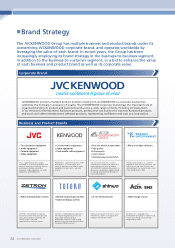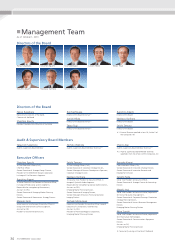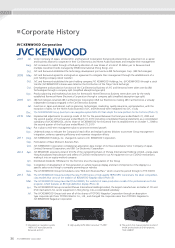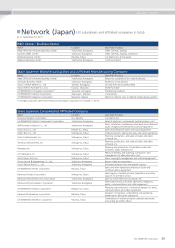JVC 2013 Annual Report Download - page 32
Download and view the complete annual report
Please find page 32 of the 2013 JVC annual report below. You can navigate through the pages in the report by either clicking on the pages listed below, or by using the keyword search tool below to find specific information within the annual report.
JVCKENWOOD believes that one of its most important management issues is to increase the transparency and
efficiency of its managerial decision-making process and improve corporate value by strengthening corporate
governance. To this end, we make it a basic policy to enhance corporate governance through the establishment of
a structure that includes checks and balances. That policy calls for dividing management and the execution of
operations, recruiting external directors and auditors, and establishing internal audit sections, as well as improving
the internal control system on a Group-wide basis.
Corporate Organizations
1. Shareholdersʼ meetings are held, as the highest decision-making body, to make corporate decisions about
fundamental matters that are stipulated in the Companies Act of Japan. However, unless otherwise specified in
law, matters stipulated in Article 459, Paragraph 1 of the Companies Act, including dividends from surplus, are
determined by resolutions of the Board of Directors — instead of shareholder resolutions — in accordance with
the Companyʼs Articles of Incorporation to enable the formulation of flexible capital and dividend policies.
The Board of Directors, which is regarded as an organization that makes fundamental and strategic decisions
while overseeing business execution, holds regular meetings once a month and extraordinary meetings when
necessary to deliberate and decide on basic management policies and important matters as well as monitor and
oversee the status of business execution. Directorsʼ terms of office are one year in order to make their
responsibilities clear and to make management processes quicker. In addition, we proactively recruit external
directors in order to increase the transparency of decision-making.
The Articles of Incorporation stipulate that the number of directors shall be less than ten. Eight directors were
elected at the 5th annual shareholdersʼ meeting held on June 25, 2013.
To ensure the efficiency of the management supervisory function based on experience, achievements,
professional viewpoints and insights, etc., as well as independence having no potential conflicts of interest with
general shareholders, JVCKENWOOD selects candidates for external directors in principle by confirming their
business backgrounds (i.e., confirming they have not been a JVCKENWOOD major shareholder or engaged in the
execution of operations in any of JVCKENWOODʼs main business partners, etc.) based on its independence
standards and policies, which are stipulated in the “guideline for the governance of listed companies” issued by
the Tokyo Stock Exchange (“TSE”). Since June 25, 2013, KENWOOD has appointed three external directors to its
Board, Koji Kashiwaya, Junichi Hikita and Takao Tsuji, and designated them as independent directors under
defined standards of the TSE. At the same time, external directors are registered with the TSE.
2. JVCKENWOOD adopts an executive officer system under which business execution functions are divided and
management responsibility and business execution responsibility are separated from each other. Since June 25,
2013, eight directors (including three external directors) and ten Executive Officers (four concurrently holding
director positions) have fulfilled these responsibilities.
To take the initiative is the areas of corporate reform and governance, the Chairman of the Board and
external directors (who are not executive officers) hold discussions with executive officers (who concurrently serve
as Directors of the Board), make relevant decisions, and delegate the authority for business execution to executive
officers. In addition, the President/Representative Director of the Board, who is a member of the Board of
Directors, also serves as CEO (Chief Executive Officer), bearing responsibilities for both management supervision
and business execution. After decisions are made at meetings of the Board of Directors, the CEO chairs the Board
of Executive Officersʼ meeting, bearing responsibilities for business execution.
As explained in its Securities Report, the JVCKENWOOD Group has four reportable business segments. To
adapt to changes in the current business environment, the Group has created the position of segment head for
each reportable segment. Segment heads are responsible for conducting performance management and
optimizing resource allocation. Seven businesses conducted by these four segments are under the direct control of
the CEO and respective General Managers. General Managers not only fulfill their responsibilities, but also
strengthen collaboration between businesses, and the CEO gives directions on cross-group business processes,
multiple development, etc. from a Group-wide perspective. Under this structure, JVCKENWOOD strengthens the
assistance functions of corporate staff in a bid to further improve the speed of organizational decision-making,
activate the entire Group organization, and promote the growth of businesses. JVCKENWOOD also adopts an
operating officer system under which operating officers are responsible for operations of important divisions (as
general managers), sales subsidiaries (as presidents) and others under the direction of the CEO. Since June 25,
2013, ten Operating Officers have built business execution teams and a management system to accomplish
important corporate tasks under the direction of the CEO and Executive Officers.
Corporate Governance Structure
30 JVC KENWOOD Corporation
Corporate Governance
























